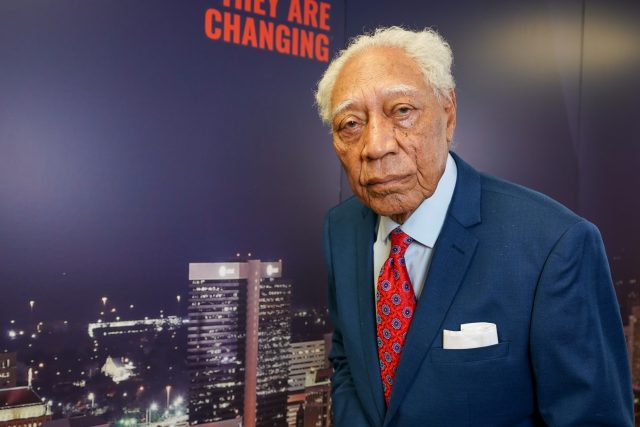
By Barnett Wright
The Birmingham Times
When Dr. Jesse J. Lewis Sr. was a student with the school newspaper at Miles College in Fairfield, Alabama, just outside of Birmingham, he went for the one interview that no Black journalist would ever consider: Alabama Gov. George Wallace, the virulent segregationist.
“[Wallace] had never given a Black person an interview,” Lewis said. “I called [his office] one afternoon, and he answered the phone. I told him who I was and what I wanted. He said, ‘I don’t have my schedule, but call me tomorrow before 12.’ I called him the next day and talked to his secretary. He told her I was going to call. I was shocked, and he gave me an interview.”
That one interview led to a friendship between the two that lasted until Wallace’s death in 1998, Lewis told the Birmingham Times in an interview.
“I had all the respect in the world for [Wallace],” said the legendary Birmingham businessman, who turned 96 in January. “I spoke at his wife’s funeral. I sat in the front row with the family, the wife’s family. I spoke at his funeral. He mandated it.”
Lewis remembers that his college interview with Wallace lasted for two hours.
“As I spoke with Wallace, I saw a side of him from a new vantage point, one that could not be captured in print or on television,” Lewis writes in his book “One Man’s Opinion: Together We Can Do This.”
Lewis, who founded the Birmingham Times in 1963 and sold it in 2015, said he prepared for the Wallace interview by compiling 50 questions, but he remembers one: “I asked him, ‘Are you a racist, and why?’”
Lewis was surprised by Wallace’s answer.
“He said, ‘Yes, … but I wasn’t born a racist. Nobody is born a racist. You’re taught it. … I’m a politician. I tell most people what they want to hear. That’s how I win office. If you had more Black folk than white folk, then I’ll support [Black people]. If the only way to win a race is tell people what they want to hear, that’s who you are,’” Lewis recalled.
Wallace also told Lewis, “I’m not going to die [a racist].”
“That impressed me,” Lewis said.
Following that exchange, Lewis forgot all the other questions he was planning to ask, but he does remember Wallace saying, “My children won’t be racists.”
The two men became such good friends that Wallace appointed Lewis in 1975 to head Alabama’s Office of Highway and Traffic Safety, the first African American to serve in Wallace’s cabinet.
“When I was appointed head of the highway department, somebody called [Wallace] on the phone and asked, ‘What you going to tell people about that Black man you hired?’ [Wallace] replied, ‘What Black man?’ [The caller] said, ‘Jesse Lewis.’ [Wallace] said, ‘I didn’t know he was Black. Now that I hired him, I think he’s qualified.’”
In his book, Lewis writes about what happened the first day he arrived on the job: “All of the white workers all of a sudden got ‘sick,’ left work, and went home. The problem they had was not a headache or a backache; it was the fact that they had never been supervised by a Black man. … The problem that I had was that in all my years of executive experience, I had never supervised a white person.”
Lewis also remembers calling his first Cabinet meeting.
“Nobody showed up,” he said. “I called the governor and told him nobody showed up. He said, ‘Call another one.’ I did, and everybody showed up. I said to the governor, ‘Everybody showed up. How did you do that?’ He said, ‘I asked them if they wanted to work.’”
Wallace, as an ex-officio member of the Alabama Board of Education, also helped appoint Lewis president of Lawson State Community College in 1978, a position Lewis held until 1987.
“One Man’s Opinion: Together We Can Do This,” by Dr. Jesse J. Lewis Sr., is available at www.onemansopinionbook.com; all proceeds from sales of the book are going in equal parts to the National Urban League, the National Association for the Advancement of Colored People (NAACP), the United Negro College Fund (UNCF), and the Southern Christian Leadership Conference (SCLC).




